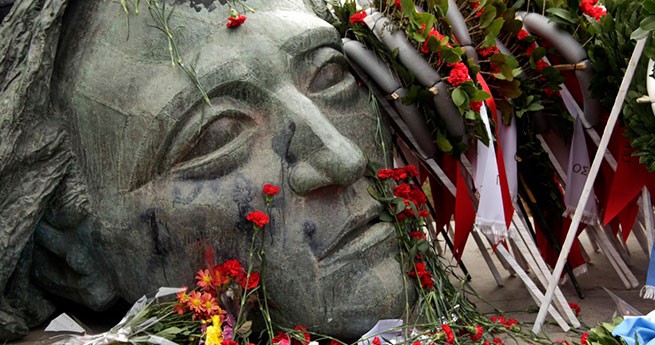In 1981, when Theo Maragos directed the poignant comedy Teach My Child to Write, Greece, and with it its education system, was oscillating between two eras: while we were in the heart of the post-communist era, the state and institutions tried to balance between the aesthetic legacy of the April dictatorship and the radicalism of the new era.
The film, which traces the echoes of post-Civil War trauma in a small village in Arcadia on the occasion of the erection of a monument to those killed during the occupation, will finally be shown on the eve of PASOK’s rise to power. In a few months everything will change.
It is in this unprecedented and slightly surreal socio-political environment that the evolution of how Polytechnic Day is covered in secondary education can be reflected. This is a long, but not always simple period with its own characteristics and contradictions, since, as Vangelis Karamanolakis, professor of modern history at the University of Athens, aptly notes, the celebration of “Polytechnic Day”, in contrast to two national anniversaries (March 25 and October 28), was organized ” from below”: “The celebration of the anniversary was not secured by any official decree, and its implementation did not acquire any protocol, no doxology, no parade that would assign a dominant role to the political leadership.”
Celebrating “change”
“Polytechnio Day” was first announced as an official school holiday and celebration a few weeks after PASOK came to power. The corresponding circular was issued by Education Minister Lefteris Verivakis on November 12, 1981, even before the new government of Andreas Papandreou received a vote of confidence in parliament, says lawyer Konstantinos Rigos. This study stems from PASOK’s keen desire to reflect the very recent political changes that took place on October 18th and the celebration of the Polytechnic Institute.
But what happened before 1981? The corresponding circular from the then Minister of Education Panagiotis Tsepos (11/17/1975) stated that “there will be no events in secondary and primary schools,” and in secondary schools only an hour-long speech by the class teacher was allowed. “Students,” emphasize Konstantinos Rigos and his collaborator Aphrodite Georgopoulou, “want to give their own dimension to the anniversary, which they consider their right to celebrate, and which excites them more, and which seems closer to them than national holidays, which they consider outdated, indignant typical celebration “Polytechnio Day”consisting of a minute of silence and a solemn speech.” Formal speeches or half-day school celebrations included in the ministry program are turned into activities, discussions, absences and participation in the celebration ΕΦΕΕ“. In practice, that is, for many secondary schools and, above all, in large cities, the school holiday began to be celebrated earlier than it was officially established.
However, the pressure in favor of establishing a school holiday was very active. In November 1975, Andreas Papandreou appealed to the government with a request to legislatively approve November 17 as a general school and general educational day. The institutionalization of school holidays by the first PASOK government was greeted with enthusiasm. According to Mr. Rigo, the press of the time noted that for the first time “Polytechnio Day” In a number of schools, it was celebrated freely and with due content, but there was also dissonance, non-compliance with government orders, cases of obstruction of events and censorship. However, the new content of the holiday is condemned by newspapers close to New Democracy and its youth (ΟΝΝΕΔ), who accuse the government and teachers speaking in schools of being biased and tying the holiday to a certain ideological framework.
Inconvenient textbooks
Professor of the Department of Teaching History at the University of Thracia Democritus Angelos Palikidis, within the framework of a recent conference ““Polytechnio Day” as Public History,” with his colleague Yiannis Evangelou, examined how the student rebellion was presented in elementary, middle, and high school history textbooks taught from 1975 to the present. Of the eleven textbooks published, eight contain relevant sections or links.
“At first glance,” says Mr. Palikidis, “the Polytechnic uprising is absent from the textbooks of the first stage of the post-independent period (1975-1981), but even in those published after that, there are noticeable differences depending on the level of the school “. Thus, the first textbooks for secondary school, containing references to the uprising at the Polytechnic Institute and to student anti-dictatorship protests in general, were published starting in the 1984/85 academic year, and the first textbook for primary school – in the early 1990s. “The events of the uprising at the Polytechnic Institute are presented in a rather limited scope, which indicates the reluctance of the authors to delve into the causes and consequences of the uprising and even connect it with the dominant social projects of the time. In contrast to the main narrative, the authors express themselves more freely in quotations (written and figurative sources with memorization), forming in many cases unique “paranarratives.” However, in any case, the vast majority of school authors adhere to a very cautious position and try not to upset the fragile balance between the contradictory public narratives of the two dominant political movements in Greek society – the right and the left. The study concludes that the inclusion of Polytechnic events in school history progresses from an initial phase of silence to a period of hesitant, cautious and, in any case, limited mention. At the same time, it is unclear what kind of historical memory they are trying to form among new generations of schoolchildren.
We thank the organizers of the conference “Polytechnic as Public History”, held at Pantheon University from November 2 to 4, and the speakers of the section “Polytechnic Day at School”.







More Stories
Making a mockery of the Acropolis for the sake of tourism
How Plato spent his last night – what the found papyri showed
Eurovision 2024: the first rehearsal of Marina Satti in Malmö has ended